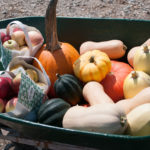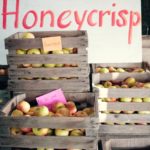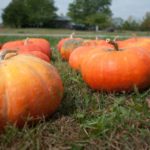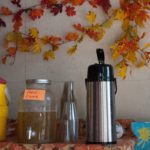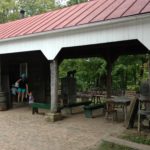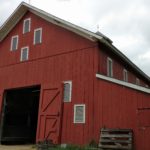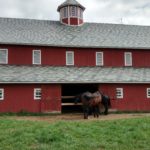It might seem a little strange to be writing about farms on a travel blog, but I did travel nearly an hour to get to them! How our food is raised, the traditions surrounding the raising of crops and livestock, and the bond of farmer to animal, crop, and consumer are also something I have a deep interest in and seek out to some degree on my travels near and far.
Our day started simply enough. We got up, took care of Meli, and headed out the door to pick up our final CSA share of the season. If you’re unfamiliar with what a CSA is, it stands for Community Supported Agriculture. In a nutshell, you pay a local farmer a number of months in advance for all of the produce they will provide you for the upcoming growing season. You are essentially investing in the farm and the return on your investment is fresh local food!
Back to our day: Today was our CSAs customer appreciation day at their farm. We arrived to a warm welcome from the owners of Paige’s Produce, were provided a shopping list, and a wheelbarrow. Based on our list we were able to roam around and hand select our produce. Different CSAs provide different options. For the two of us, we pay for a half share of vegetables and as an add on, a half share of fruit. There was a great variety this year and the growing season rewarded all of us nicely! We have tons of butternut squash which is one of my favorite foods, particularly when Ed turns it into soup. Drool.
After working up a small appetite collecting our produce, roaming the farm, and checking out two impressive orb weavers on the side of a barn, we ventured over to their house for soup, mac & cheese, homemade cookies, and fresh apple cider. Such a great treat! Not every CSA holds an event at their farm for their customers, but in my opinion they should. CSAs encourage you to not only support local, but to really see where your food is coming from and get to know the people who make it possible.
- Our fall CSA produce
- Honeycrisp apples!
- Cinderella Pumpkins
- Farm fresh, homemade apple cider
As we were making our way back home, we passed one of our metro parks and made a u-turn. We haven’t been to this park before. Part of the reason we hadn’t made the journey is because there are only three short pet friendly trails and they aren’t allowed at the Living Historic Farm at all. I feel guilty having fun in nature while Meli sits at home. Today was serendipitous though as we were already in the area. I made it up to her by taking her for a walk at the park closer to home after dinner. ?
Slate Run Living Historical Farm is really cool. It must have been wonderful living there as an original home owner. The setting is idyllic. Lovely trees, wide open pastures, fields, a pond. I will say the lack of indoor plumbing would be the tough one for me. I could survive without electricity, I think, but am incredibly attached to a flushing toilet. The main barn is huge and beautifully maintained. The property is complete with the summer kitchen, root cellar, smoke house, outhouse, and a number of other out buildings. Around the farm we met the employees and volunteers who work the farm as if it were in a time capsule from the late 1800’s; as well as chickens, sheep, geese, ducks, cows, hogs, turkeys, guinea hens, and of course draft horses!
- Original farm house
- Summer kitchen
- Classic big red barn 🙂
- Draft horses
Having just come from a modern working farm, it was interesting to see the differences of small working farms then and now. The biggest difference, aside from indoor plumbing, is horse power. Literally. While some of the plows and other machinery are similar, now they are pulled by tractors instead of draft horses. Materials for many storage structures have shifted from wood to metal. If a part was needed, they needed to craft it themselves instead of going to the local hardware store or mechanic. Aside from that, it is remarkable how little has changed. I think that is a testament to how well the system works and the pride achieved in those who work the land.
I encourage you to learn more about the history where you live and anywhere you travel. If it doesn’t give you a deeper appreciation for the place you’re in and the people who live there, you’re doing it wrong.
I also would like to encourage you to look up your local farmers to see if they offer a CSA or similar program. If not, maybe reach out to ask if they would start one. Almost everyone used to raise at least some of their own produce. It is only in recent human history that we’ve begun to deviate farther away from our food sources. When we lose touch with our local farmers, we lose touch with ourselves.


